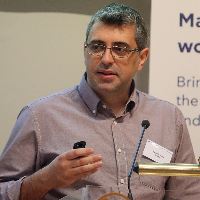The Skills Fair for Quality Apprenticeships is a hybrid event taking place in Turin in the ITC-ILO campus and online through the Vfair platform from 27-29 February 2024.
In June 2023, ILO tripartite constituents adopted the Quality Apprenticeships Recommendation (R208) that includes elements to both promote and regulate apprenticeships. The Recommendation defines apprenticeships, distinguishing them from other forms of work-based learning. It includes a framework for their regulation, with defined rights and entitlements for the protection of apprentices. It also defines the elements of apprenticeship agreements, and the actions to be taken to ensure that apprenticeships are inclusive and non-discriminatory. Finally, it lists actions to be taken to promote the expansion of apprenticeships.
The fair will be a tripartite event, with a b emphasis on the key role of employers’ and workers’ organizations in designing, implementing, monitoring and evaluating apprenticeships policies and programmes.
This one-of-a-kind event embraces a hybrid format, seamlessly blending the physical presence at the ITCILO Campus in Turin and the virtual realm through a Virtual Fair, using a state-of-the-art virtual event platform.
The event will have real-life testimonies in booths and panel sessions: attendees, whether on-site or online, will have the opportunity to engage with real-life testimonies showcased on booths and featured in panels. These authentic stories bring to life the impact of quality apprenticeships on individuals, companies, and communities.
Booth exhibitors will showcase innovative approaches to skill development and
learning within apprenticeship programs.
Check the Agenda and join us!
 February 27, 2024 09:00
February 27, 2024 09:00
Moderator: Pilvi Torsti
Director of the European Training Foundation

Amanda Brown
ITUC UK
Cristina Gueco
Global Apprenticeship Network

Srinivas Reddy
ILO Skills

Luís Claudino de Oliveira
Ministry of Labour, Solidarity and Social Security, Portugal
The opening session will aim at setting the scene and preparing the three days of discussions about quality apprenticeship, from different stakeholders’ points of view. It will provide information about existing challenges, priorities and initiatives deployed by unions, employers, governments and international organisations for quality apprenticeships.
 February 27, 2024 10:00
February 27, 2024 10:00
Moderator: Amadou Sako
IOE
Richard Bigirwa
National organisation of trade unions Uganda

A V Venkatesh Kumar
Buhler India

Xian Guan
ILO Country Office for China and Mongolia

Soulèye Kane
Director of Apprenticeship, Ministry of Vocational Training, Apprenticeship and Integration, Senegal

Maimouna Kanté
DGFPT Senegal
This session will explore the transformative impacts of quality apprenticeships in Asia and Africa, featuring insights from these regions. The discussion aims to:
- Spotlight on Successful Apprenticeships: Presenting exemplary apprenticeship programs across various regions, focusing on their strategies and achievements.
- Exploring Expansion Tactics: Examining methods to elevate apprenticeships on a global scale, enhancing their quality and accessibility.
- Enhancing Career Opportunities for Youth: Discussing the role of innovative and adaptable apprenticeship curricula in boosting employment prospects for young individuals.
 February 27, 2024 11:00
February 27, 2024 11:00The hybrid Fair on Quality Apprenticeships opens up and the Exhibitors’ stands will be reachable both physically in Turin and on the Virtual Fair platform set-up for the event. Exhibitors will also be given the possibility to organize hybrid seminars which will be hosted physically on the ITCILO Campus in Turin and available online for stakeholders interested in specific topics which are part of the Recommendation 208 on Quality Apprenticeships. Sessions to be added here.
 February 27, 2024 13:00
February 27, 2024 13:00
Moderator: Urmila Sarkar
Programme Director GenU

Italo Dutra
UNICEF LAC RO

Trevor Gauld
ACTU Australia

Cecilia Pugliese
ILO Skills

Abhishek Gupta
UNICEF

Christine von Harrach
DC dVET

Vlasis Korovilos
Cedefop

Andreas Mueller
CAMEXA (AHK Mexiko)

David Rodriguez Calvo
Apprenticeship Project Manager, Adecco Italy

Iqbal Hossain
UNICEF
This plenary session will reflect upon the role of Quality Apprenticeships in the Future of Work. Inspiring speakers will focus on the evolution of apprenticeships in an era that is characterized by pervasive digitalization and an increasing use of Generative Artificial Intelligence. The potential impact of Quality Apprenticeships in the just transition towards environmentally sustainable economies and societies for all will also be at the centre of the session reflections. Since it is extremely important that apprenticeships work well for both apprentices and employers, company cases will also be presented to exemplify the Return on Investment for employers to invest in apprenticeship, including how the “business case on apprenticeships” can drive expansion of programs in emerging sectors.
 February 27, 2024 14:00
February 27, 2024 14:00This time slot is specifically allocated for the participants to go and visit the physical and online exhibition spaces. It is the moment to know more about the positive experiences happening all around the world and be inspired to improve one’s own programmes and policies. Exhibitors will be given once again the opportunity to organize specific sessions on topics contained in R208, to advance the agenda for Quality Apprenticeships
 February 27, 2024 16:00
February 27, 2024 16:00
Moderator: Gonzalo Grana
CINTERFOR

Gustavo Gandara
CGT Argentina

Hanna Abou-El-Seoud
Nestlé

Kelly Lima Teixeira
SENAC

Andres Robalino
Cuenca Chamber Ecuador
Nicholas Morgan
Adaptive Constructions Solutions (ACS)
The session will consist of conversations with each of the participants of the panel, on topics previously agreed with each of them, focusing on the dimensions and aspects of their experience, role and type of organization they represent, most relevant to the objectives of the panel.
The logic of the order of appearance is to move from companies implementing apprenticeship programmes, to an intermediary organization, and then to the viewpoint of the TVET provider. The session closes with the inputs from the social partners, reflecting on a system and policy level, highlighting the role of social dialogue in quality apprenticeships, as highlighted in Recommendation 208 of the ILO.
 February 27, 2024 17:00
February 27, 2024 17:00
Moderator: Matthias Themel
ETF

Carlo Friesing
CSL Luxembourg, and member of the ETUC VET Committee

Nibras Aziz
Danish Industry
Mahdi Omar Farah
Djibouti
Social dialogue is at the heart of creating and maintaining quality apprenticeship systems. The session will examine how social dialogue works in practical terms, and how social dialogue contributes to managing the quality of apprenticeships, in their design, governance and implementation, connecting national industrial relation systems to education and training systems. The interests and expectations of the tripartite actors will be described, with panel members bringing concrete examples from Africa and Europe. In an interactive discussion, panel members will reflect on (pre-) conditions for effective social dialogue and specific challenges related to formalising informal apprenticeship systems. The audience of the session will be involved through polls and invited to bring their questions to the panel discussion.
 February 28, 2024 09:00
February 28, 2024 09:00
Moderator: Vera Dos Santos Costa
ITCILO ACTRAV

Paolo Salvai
ITCILO ACTEMP

Claire la Hovary
ILO ACTRAV

Amadou Sako
IOE

Marilia Mendes
UNIA Switzerland

Ahmad Salem
Director of Education Affairs Administration at GDDS-ATS, Ministry of Education and Technical Education (MoETE) in Egypt
The session aims et dive deep in the strategies that can be put in place to respect, promote and realize the fundamental principles and rights at work of the apprentices.
The session will frame the challenges of the protection of apprentices in a tripartite perspective. It will start by putting the International labour standards as the global layer of the guarantees for the protection at the workplace. The Recommendation R208 has to be positioned in this broader context to give the participants the possibility to enlarge their scope of references regarding the International Labour organisation. ILO ACTRAV and ITCILO ACTEMP will also give the global social partners’ views on the protection of the apprenticeships. To illustrate the governmental approach on quality apprenticeships, the government of Egypt will share their approach on the how to better implement the R208. The session will dive into a more concrete perspective by exchanging on different challenges faced by the Employers and the Workers at the workplace. From the benefits of the protection of apprentices for the Employers to the necessity to develop tools for the protection for the most vulnerable groups of apprentices as the migrants, the session will actively engage with the participants on their experiences related to some innovative solutions.
 February 28, 2024 09:00
February 28, 2024 09:00
Moderator: Sara Ciet
INTERVET Western Balkans

Cicero Silva
Trade Union Confederation of the Americas (TUCA)

Gary Workman
Executive Director Group Training Association of Victoria Inc. Trading as Apprenticeship Employment Network & Global Apprenticeship Network - Australia

Ramona David
Cedefop

Mikael Hautchamp
IGAS
Mobility abroad is nowadays considered an added value for the young people, especially for the ones looking for a professional specialisation developing skills that can be used at local and global level.
Speaking about mobility for apprentices there are challenges and obstacles that limit the possibility to access mobility opportunities and impact on the quality of the experience.
Obstacles are present at a local and international level and they touch both the training system and legal framework.
Starting from a Cedefop research, we will learn about which obstacles there are in the European Union for the long term mobility in apprenticeship. Then we will see how they deal in Australia and in French with similar challenges, but in different contexts.
We also will see how in South America different kinds of institutions (Trade Union of the Americas and the Vocational Training Union Network) deal with assessment and homologation of qualification, that is needed from the companies and apprentices’ point of view, to make mobility a real added value for apprentices' curricula.
 February 28, 2024 11:00
February 28, 2024 11:00 February 28, 2024 11:00
February 28, 2024 11:00
Moderator: Patrick Daru
ILO Skills
Corinne Savart-Debergue
CGT France

Tamas Varnai
European Commission, DGEMPL

Gideon Murenga
GIZ TVET project Kenya

Douglas Opio
Federation of Uganda Employers
This session’s goal is to understand the difference between apprenticeship programmes and regulated apprenticeship systems, the standards for regulation set by R208 and the social dialogue processes that lead to them.
 February 28, 2024 13:00
February 28, 2024 13:00 
Moderator: Bernd Mueller
ITCILO EPAP

Maria Tsirantonaki
ITUC

Patrick Daru
ILO Skills
Nicholas Morgan
ACS

Martin Wandera
Uganda
This session will be held in the format of a panel discussion around the R208. Key topics of discussion will be:
The session will be structured as an ‘asymmetric’ panel discussion, where the audience will have the opportunity to hear from constituents who were centrally involved in the adoption of R208, as well as a more technical contribution from senior ILO officials on the contents and essence of R208.
 February 28, 2024 14:00
February 28, 2024 14:00 February 28, 2024 14:00
February 28, 2024 14:00
Moderator: Stefano Merante
ITCILO

Chris Roberts
CLC Canada

Stefan Thomas
ETF
Lindiwe Sephomolo
Association of Lesotho Employers & Business

Moussa Yacoubou
FMFP Madagascar

Mergim Jahiu
Senior Advisor, International Affairs, Swiss Federal Institute for Vocational Education and Training, SFUVET
This session aims at presenting various existing approaches on financing quality apprenticeship, identifying the sources of funding, and discussing the role of the various stakeholders (social partners, government, local authorities…) in the design, implementation, monitoring and evaluation of such policies. It will also be the opportunity to discuss how funding strategies can be designed to include specific groups (women, indigenous people…) or promote specific topics (green, climate, use of new technologies…). A focus will be made on training funds, their governance and their funding schemes and how they can mobilize to finance dual apprenticeship, notably in the informal sector. The session will be the opportunity to share the examples of a diversity of contexts (Canada, Europe and neighbouring countries, Anglophone and Francophone Africa).
 February 28, 2024 16:00
February 28, 2024 16:00
Moderator: Ulrike Schmidt
GIZ & TVET Academy of GIZ/UNEVOC Centre Magdeburg, Specialist for Skills Development in TVET

Kennedy Rwehumbiza
ATE

Michael Jöhr
SFUVET

Sigfrido Pilone
Director Fondazione ITS Mobilità sostenibile – Aerospazio/Meccatronica

Kossi N’Guissan
Director INFPP Togo

Kabassima Bararmna-Gnalimba
Deputy Director of Vocational Training and Apprenticeship Togo

Olga Harms
GIZ TVET specialist

Rhianwen Roberts
University and College Union (UCU) UK
This technical session intends to offer a deep dive beyond the awareness raising of the crucial role of TVET teaching staff and in-company trainers in assuring the quality of apprenticeships by presenting possible measures and context specific solution approaches that better shape the role and competencies of TVET personnel. Together with speakers from TVET research and TVET implementation, the audience will dive into transferable international perspectives on the role and potential of teaching and training staff in dual apprenticeships.
 February 28, 2024 16:00
February 28, 2024 16:00
Moderator: Stefano Merante
ITCILO

Christine Hofmann
ILO Skills

Eulogia Familia
CNUS Dominican Republic

M. Cyr Davodoun
CMA Benin

Talal Hizaji
ALI-Lebanon
Informal apprenticeship remains the principal means of developing professional skills in many countries. Strengthening those longstanding systems is a major challenge that requires policy and programmatic interventions to upgrade informal apprenticeships in a transition process towards quality apprenticeships in the medium to long term.
 February 29, 2024 09:00
February 29, 2024 09:00
Moderator: Eleonora Pantò
ICDE

Aissatou Barry
National Director of Vocational Training Guinea

Christine Hofmann
ILO Skills
Shruti Patidar
IUF Asia Pacific

Fation Dragoshi
S4J Albania
Stéphane Bonutto
Accenture

Vidyu Allapally
Accenture
Dibyendu Mukhopadhyay
Participant Aarambh program
Sravika Dayawar
Participant, Aarambh program

Katherine Hall
Executive Director of the Construction and Infrastructure Centre of Vocational Excellence of conCOVE, New Zealand
Jane Kamau
NITA

Dikel Delvariste
Director INFP Haiti
Vicki Lewis
Six Nations Polytechnic, Canada, ICDE member
This two-hour session will bring together speakers from several world regions providing examples and case studies of EDI in quality apprenticeships. The session starts with an overview of the topic and the recommendation from ILO representative, Christine Hofmann, followed by presentations from seven speakers from a variety of organisations. You will also have the opportunity to hear directly from apprentices who wish to share their stories. The session will conclude with a final panel session and Q&A inviting our speakers to suggest their advice of how best to incorporate EDI in quality apprenticeships.
 February 29, 2024 11:00
February 29, 2024 11:00
Moderator: Mervi Jansson
CEO OEP

Gary Workman
Executive Director Group Training Association of Victoria Inc. Trading as Apprenticeship Employment Network & Global Apprenticeship Network - Australia

Dean Luciani
CEO Westvic Staffing Solutions

Mirjana Kovačević
Chamber of Commerce and Industry of Serbia

Sylvia Casaro Dietert
AFL-CIO Working for America Institute (WAI) US

Sophie Mbenoum
Gouvernement Cameroun

Arsene Epoune Yetna
Gouvernement Cameroun
This session will provide an overview of the intermediary model and how it can contribute to quality apprenticeships in an SME setting. The panelists will share practical experiences from Australia, the US, Serbia and Cameroun, addressing different sectors and the ecosystems they have created to scale quality apprenticeships in their own country.
 February 29, 2024 11:00
February 29, 2024 11:00 Moderator: Samuel Asfaha
ILO ACTEMP

Adékoulé Wolou Djamba
Director of statistics, research and planning ETFP Togo

Julian Uehlecke
DGB Germany

Valentina Stoevska
ILOSTAT

Florencia Suau
Departamento de Educación de la Unión Industrial Argentina (UIA) y coordinadora de GAN Argentina.

Cristina Mereuta
ETF
Exploring the intricacies and significance of data and LMIS within the context of apprenticeships, the session discusses present challenges, proposes solutions, and provides practical examples throughout the apprenticeship lifecycle, covering LMIS systems, skills investigation tools, and innovative methodologies. The session begins by establishing foundational LMIS concepts and components. A particular focus on the measurement framework for workplace learning will be explored, shedding light on effective planning, implementation, dissemination, and evidence utilization for quality apprenticeships. Emphasizing the crucial roles of updated and comparable labour market data, the session underlines the importance of a standardized statistical framework to ensure consistent reporting of work-based learning.Further discussion delves into the roles of governments, enterprises, intermediaries, and stakeholders in LMIS. Emphasis is placed on best practices and leveraging technology strategically for efficient data production, sharing, dissemination, collaboration, and coordination among stakeholders. Real-world experiences shared during the session aim to inspire collaborative efforts to enhance global practices in quality apprenticeships.
 February 29, 2024 13:00
February 29, 2024 13:00
Moderator: Andreas Klemmer
ITCILO

Srinivas Reddy
ILO Skills

Mia Seppo
ILO Assistant Director General for Jobs & Social Protection

Luc Triangle
ITUC General Secretary

Blaise Matthey
IOE Vice-President for Europe and Central Asia
This plenary session serves as a call to inspire organizations committed to championing quality apprenticeships.
It introduces the Network of Champions, dedicated to advancing quality apprenticeship as per R208 globally.
Simultaneously, it reflects on instruments and modalities facilitating continuous dialogue and the exchange of best practices among stakeholders, and to drive progress beyond the event.
 February 29, 2024 14:00
February 29, 2024 14:00
Moderator: Kathryn Rowan
Executive Director, Global Apprenticeship Network

Jonas Eriksson
LO Sweden

Dr. Peta Skujins
GAN Australia

Christine von Harrach
DC dVET

Ilona Medrikat
BIBB

Cecilia Pugliese
ILO Skills

Patrick Daru
ILO Skills

Eleonora Gonnelli
ITCILO
Panellists and audience members will dialogue and share examples of actual initiatives, tools and programs that are currently up and running that can immediately be leveraged and used to encourage multi-stakeholder collaboration and further promote and embed Quality Apprenticeships.
International Labour Organization (ILO), its International Training Centre (ITCILO) and its Inter-American Centre for Knowledge Development in Vocational Training (ILO/CINTERFOR), the International Trade Union Confederation (ITUC),the International Organisation of Employers (IOE), the Global Apprenticeship Network (GAN), the European Training Foundation (ETF), the French Development Agency (AFD), the Institut de la Francophonie pour l’éducation et la formation (IFEF) and the International Council for Open and Distance Education (ICDE). Technical inputs will be provided by GIZ Gmbh and other like-minded partners.